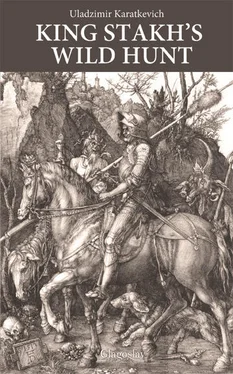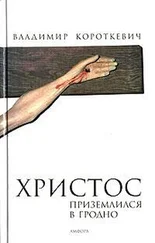And late in the evening King Stach's Wild Hunt appeared again. Again it howled, wailed, cried, its voice an inmuhan voice:
“Raman of the last generation, come out! We have come. We shall put an end to all! Then we shall rest. Raman! Raman!”
And again, lying hidden in the bushes at the entrance, I shot at the flying shadows of horsemen that flashed by at the end of the lane lit up by a misty moon. When I shot the first time, the horses threw themselves into the thicket and disappeared, as if they had never even been. It resembled a horrible dream...
It was necessary to put an end to things. I recalled Mark Stachievič's words spoken beneath the tree, concerning Raman's promise that after his death he would give away the murderer, and I thought that Raman might have left some clue in the house or at the place of his death. A clue that even Ryhor's vigilant eye had overlooked.
And when Ryhor came we hurried together to the place where Raman had been murdered. I am not a bad walker, but I could hardly keep up with this leggy figure. It might have seemed, looking at him, that Ryhor was walking slowly, but his movements were measured, and his feet he placed not as ordinary people do, but with his toes turned inward: all born hunters walk that way. By the way, it has been observed that this makes every step approximately one inch longer. Along the way I told him about the conversation between Mark Stachievič and some Pacuk.
“Varona's men,” Ryhor angrily growled. And then added: “But we had thought that ‘Likol’ is the beginning of a surname. You, sir, hadn't asked the right way. ‘Likol’ is evidently a nickname. You must ask Miss Janoŭskaja who is called that. If Śvieciłovič knew this nickname and perhaps, even, Bierman, it means that she must also know it.”
“I asked her.”
“You asked her about a surname, said that it was its beginning, but not that it's a nickname.”
In this way we came to the well-known place which I have twice described, the place where Nadzieja Ramanaŭna's father had perished. We sought all over in the dry grass, although it was stupid to look for anything in it after two years. And finally we came up to a place where there was a precipice, not a large one, over the quagmire.
Over the abyss a rather small stump met our sight sticking out from the earth, the remnant of the trunk of a tree that had grown there long ago, roots spreading throughout the abyss like mighty snakes, roots reaching downwards into the quagmire, as if there to quench their thirst, roots simply hanging in the air.
I asked Ryhor to recall whether Raman's hands had been visible over the quagmire.
Ryhor's eyes lowering, he was remembering:
“Yes, they were. The right one was even stretched out, he must have wanted to catch hold of the roots, but couldn't reach them.”
“But perhaps he simply threw something there where a hole is visible under the roots?”
“Let's look.”
And holding onto the roots, and breaking our finger-nails, we let ourselves down almost into the very mire, hardly able to hold onto the small slippery ledges of the steep slope. A hole did indeed turn out to be under the roots, but there was nothing in it.
I was about to climb up to the top, but Ryhor stopped me:
“Stupid we are. If there really was something here, then it is already under a layer of silt. He could have thrown something, but you know, two years have passed, the earth there in the hole will have crumbled and buried it.”
We began scratching the caked silt with our fingers, emptying it out of the hole, and — believe it or not, — soon my fingers hit on something hard. In the palm of my hand lay a cigarette-case made of maple wood. There was nothing else in the hole.
We climbed out and carefully wiped off from the cigarette-case the reddish silt mixed with clay. In the cigarette-case lay a piece of white cloth which Raman had evidently torn out from his shirt with his teeth. And on this little rag hardly decipherable reddish letters: “Varona mur...”
I shrugged my shoulders. The devil knows what this meant! Either evidence that Varona killed Raman, or a request to Varona to kill someone. Ryhor was looking at me.
“Well, so now it's clear, Mr. Andrej. Varona drove him here. Tomorrow we shall take him.”
“Why tomorrow? He may come today even.”
“Today is Friday. You, sir, have forgotten this. People say: ‘Look for the cut-throat in the church.’ Really too holy and godly. They kill with the name of the Holy Trinity on their lips. They will come tomorrow because they've lost all patience. They have got to get rid of you.” He became silent, a harsh flame blazed in his eyes. “Tomorrow, at last, I'll bring the mužyks. With pitchforks. And we'll give you one, too. If you're with us, then you're with us to the end. We'll lie in wait at the broken-down cross. And all of them we'll finish off, all of them. To the very roots, the devil's seed.”
We went together to Marsh Firs and there we learned that Miss Nadzieja was not alone. Mr. Haraburda was with her. Janoŭskaja had been avoiding me lately, and when we met she would turn her eyes away, eyes that had grown dark and were as sad as autumn water.
Therefore I asked the housekeeper to call her out into the lower hall where Ryhor was somberly looking at St. Yuri, himself as powerful and tall as the statue. Janoŭskaja came and Ryhor, ashamed of his footprints all over the floor, was hiding his feet behind an armchair. But his voice when he addressed her was as formerly, rough, though somewhere deep down within him, something trembled.
“Listen, clever Miss. We have found King Stach. It's Varona. Give me a pair of guns. Tomorrow we'll put an end to him.”
“And by the way,” I said, “I was mistaken when I asked you whether you knew a person whose surname began with ‘Likol’. Now I want to ask you whether you know a person whose nickname is Likol, simply Likol. He is the most dangerous man in the gang, perhaps its leader even.”
“No!” she screamed suddenly, her hands clutching at her breast. Her eyes widened, frozen with horror. “No! No!”
“Who is he?” Ryhor asked darkly.
“Be merciful! Have pity on me! That's impossible... He is so kind-hearted and tender. He used to hold Śvieciłovič and me on his knees. Our childish tongues at that time couldn't pronounce his name, we distorted it and that gave birth to the nickname by which we called him only among ourselves. Few people knew this.”
“Who is he?” adamantly repeated Ryhor moving stone jaws.
And then she began to weep. Cried, sobbed like a child. And through her sobbing finally escaped:
“Mr. Likol... Mr. Ryhor Dubatoŭk.”
I was horror-stricken to the very heart. Dumbfounded!
“Impossible! Such a good man! And, most important, of what benefit is it to him? After all, he's not an heir!”
And my memory obligingly reminded me of the words of one of the scoundrels under the tree: “He's in love with antiquity.” And even the undeciphered “...ly ma...” in the letter to Śvieciłovič suddenly turned naturally into Dubatoŭk's favourite byword: “Holy martyrs! What's going on here in this world!”
I wiped my eyes driving off my confusion.
Like lightning the solution flashed through my mind.
“Wait here, Nadzieja Ramanaŭna. And Ryhor, you wait, too. I'll go to Mr. Haraburda. Then I'll have to look through Bierman's things.”
Up the stairs I ran, my mind working in two directions. Firstly: Dubatoŭk might have arranged matters with Bierman (why had he killed him?) Secondly: Haraburda also might have been dependent on Dubatoŭk.
When I opened the door, an elderly gentleman with Homeric haunches, got out from his armchair to meet me. He looked at my determined face in surprise. “Excuse me, Mr. Haraburda,” I flung at him sharply, “I must put a question to you concerning your relations with Mr. Dubatoŭk: why did you permit this man to order you about?”
Читать дальше



